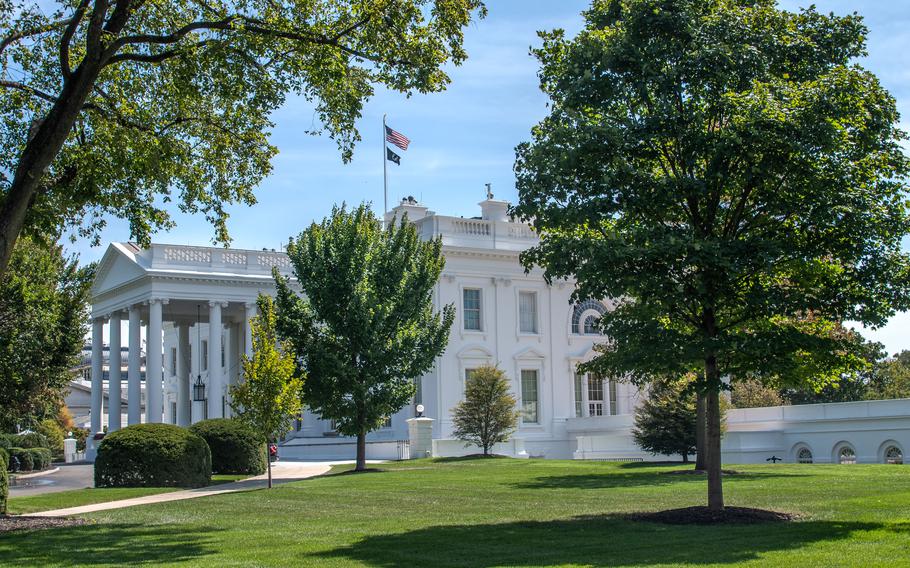
A view of the White House from the western corner of the South Lawn on Sept. 5, 2023. (Carlos Bongioanni/Stars and Stripes)
WASHINGTON — The White House on Monday rebuked a defense spending bill set to be considered this week by the House, announcing President Joe Biden would veto legislation that harms access to reproductive health care for troops and threatens minority groups.
The $886 billion bill funds the Defense Department for fiscal 2024 and received no Democrat support when it passed through the Republican-led House Appropriations Committee in June. Conservatives loaded the measure with provisions targeting abortion access, diversity policies and climate change.
“The administration strongly opposes the numerous policy provisions that, if enacted, would impede the department’s ability to implement the National Defense Strategy and support the nation’s service members and their families,” the White House’s Office of Management and Budget said in a statement.
The administration directed its harshest criticism toward a provision that prohibits the Pentagon from spending funds to support access to reproductive health care. The Defense Department provides leave and travel reimbursement for troops and family members who cannot access abortion care and other services in states that banned the procedure last year.
“Access to reproductive health care is critical to service members and their families, and the department’s ability to recruit, retain, and maintain the readiness of a highly qualified force, of which nearly 20 percent are women,” the administration said.
Rep. Ken Calvert of California, the Republican chairman of the House Appropriations defense subcommittee, said in June that conservative measures were inserted into the bill to help steer the Pentagon away from “culture wars.” The Democrat-led Senate Appropriations Committee eschewed politically charged provisions in its version of the bill, which it passed on a bipartisan basis in July.
The Senate will begin debating its appropriations bills on the floor this week as the House takes up its defense spending bill. Both chambers are racing to avoid a government shutdown in October and are looking to pass a stopgap spending bill by the end of the fiscal year on Sept. 30 to keep money flowing to the Defense Department and other government agencies.
Negotiations over government spending have become contentious since Republicans took control of the House this year, with the party’s small hard-right faction gaining influence over House Speaker Kevin McCarthy, R-Calif. House Republicans were able to extract flat funding levels from the White House in the spring after a fight with Democrats over the debt ceiling.
The administration said Monday that it negotiated the debt ceiling agreement “in good faith” with McCarthy but House Republicans were not doing the same in return. The appropriations bills pushed by House Republicans will hinder climate change initiatives, prevent the administration from promoting diversity, equity and inclusion, and harm sexual and gender minorities, the White House argued.
Administration officials said they specifically oppose a provision in the House defense bill that cuts $715 million from climate change-related efforts in the Pentagon.
The administration also came out against a Republican proposal to transfer Mexico from U.S. Northern Command’s region of responsibility to U.S. Southern Command, arguing the move would “disrupt North America’s unified defense approach and create a seam between two combatant commands on the U.S. border.” House Republicans said the transfer would enable “better coordination and prioritization” in countering the flow of illicit fentanyl and synthetic opioids.
The White House also opposed provisions on pay for the most junior enlisted service members and the military’s civilian employees. All service members would receive a 5.2% pay raise under the House and Senate versions of the defense funding bill.
The administration said it would not support permanent basic pay increases proposed for ranks E-1 to E-6 until a quadrennial review of military compensation is completed. The pay hikes endorsed by the House would be underfunded, lead to “pay compression” in some areas of the enlisted military basic pay table and remove an incentive for enlisted members to seek increased responsibilities and earn promotions, the White House said.
There was also strong administration opposition to a proposed $1 billion cut to civilian personnel funding.
“This reduction would degrade the department’s ability to execute its mission and operations, adversely impact readiness, and negatively affect civilian recruitment and retention, a vital piece of the total force,” the White House said.